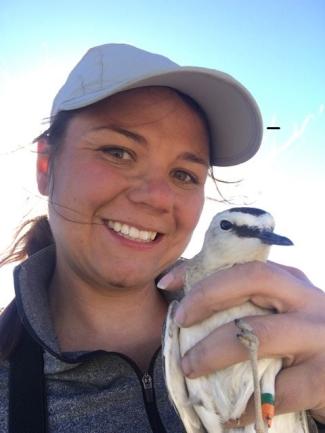CU Denver Dept. of Integrative Biology
Graduate Student Ph.D. Comprehensive Exam
ALLISON K. PIERCE
Integrative Biology Ph.D. Candidate in Dr. Michael Wunder’s Lab
WHEN: Sept. 30, 2021, at 9 am MDT
WHERE: Seminar will be presented via Zoom
Zoom Meeting: You can email Jacki Craig for the Zoom Link Information and preferably before 12:25 on the day of the defense.
Life history trade-offs of seasonal migration: a theoretical foundation for understanding the migration ecology of an inland shorebird (Charadrius montanus)
Life history theory proposes that when resources are limited organisms develop behavioral, physiological, and/or anatomical adaptions to optimize fitness trade-offs between life-history traits such as lifespan, maturation age, and fecundity. Seasonal animal migration comprises a suite of behavioral and physiological adaptations to cope with seasonally abundant resources by periodically relocating to locations with more favorable conditions. This suggests that seasonal bioenergetic constraints may play an important role in the adoption and maintenance of migratory behavior and that migration is an important part of an animal’s life history strategy to mediate fitness trade-offs. Characterizing life history strategies, the environmental factors that shape them, and their flexibility can provide insight into understanding and predicting responses to the ever changing natural environment at both the individual and population scale. Despite extensive research into the bioenergetics and evolution of migration, associations between migration, life history, population demography and distribution are often unpredictable due to lack of strong theoretical foundations and incongruity between empirical findings. My dissertation research aims to expound and extend current life-history theory by combining theoretical and empirical approaches to generate hypotheses about how behavior and seasonality shape life-history traits and mediate trade-offs in migratory animals. I will explore these concepts by developing a simulation model of bioenergetic trade-offs in seasonal environments to conceptualize the dynamic energetics of trait-covariation for different migratory movement phenotypes. I will then use this theoretical framework to interpret empirical observations and generate hypotheses about how life history and energetics may influence the extent environmental factors affect migration, survival, and reproduction in a migratory shorebird species of conservation concern, the Mountain Plover (Charadrius montanus).
Everyone is welcome to join the seminar, please see the Zoom link information above.
